Voices of Gaza in Sussex
Posted on behalf of: Summer of Research - 2025
Last updated: Friday, 20 June 2025
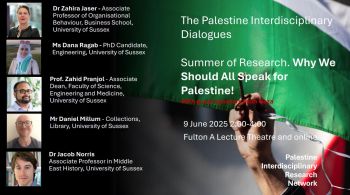
On 9 June 2025, the University of Sussex hosted a powerful and thought-provoking event as part of the Palestinian Interdisciplinary Dialogues and the Summer of Research series, titled Why We Should All Speak for Palestine!
Held in Fulton A Lecture Theatre and livestreamed online, the event brought together staff, students and invited guests—from Sussex and Palestine—to explore the historical, political, psychological and archival dimensions of the Palestinian experience. The programme featured contributions from academics across the University and guest speakers joining remotely from Gaza.
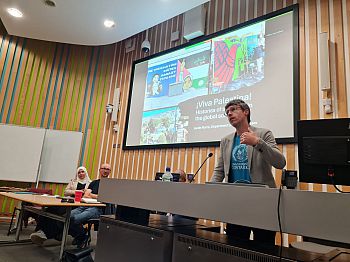
We were honoured to be joined online by academic and medical speakers from Gaza, who generously shared their time and expertise despite the immense challenges they face. For their safety, we have not included their names in this article. Their contributions offered powerful first-hand testimony, speaking to the daily realities of life under siege, the psychological and medical impacts of prolonged conflict, and the profound mental health toll on individuals and communities. They also offered deeply informed reflections on the history of colonisation and the ongoing dynamics of settler colonialism in Palestine, grounding their lived experience within a broader historical and political context. Their voices were a vital and moving part of the dialogue.
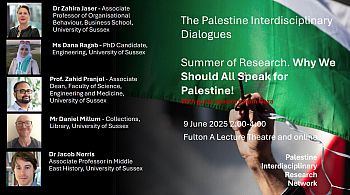
Dr Zahira Jaser, Associate Professor of Organisational Behaviour at the Business School, gave a deeply personal and academic exploration of silence as a structure of oppression. Her presentation, Choked: The Psychology of Silence, unpacked how anti-Palestinian racism operates in Western institutions, and how systemic silencing affects both individual and collective identity. Drawing on Fanon, postcolonial psychology and her own published work, Dr Jaser called for meaningful resistance through voice and visibility.
Ms Dana Ragab, PhD candidate in Engineering, shared her lived experience as a Palestinian academic navigating systems of racialised erasure and emotional fragmentation. Her words highlighted the psychological cost of what she described as “being exiled while standing in place”.
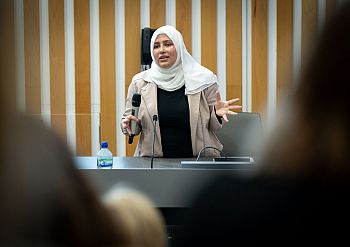
Mr Daniel Millum, from the University Library's Collections team, spoke about Sussex’s holdings in the BLDS Legacy Collection—a rich archive of publications from across the Global South. He highlighted historical examples of international solidarity with Palestine from organisations and publications in Cuba, South Africa, Tunisia and beyond. These archives are accessible to students and researchers via the University’s dedicated collection site.
Dr Jacob Norris, Associate Professor of Middle East History, explored the historic and often under-recognised connections between Palestinian liberation and movements for justice across the Global South—particularly in Latin America. His presentation focused on Chile, home to one of the largest Palestinian diasporas outside the Middle East. He highlighted how, during the 1960s and 70s, members of Chile’s Palestinian community played a key role in aligning the Palestinian cause with broader struggles against dictatorship, colonialism and imperialism. Through cultural, political and grassroots organising, Palestinian solidarity became deeply embedded within Chile’s leftist movements, creating enduring transnational links that continue to shape perspectives on Palestine in Latin America today.
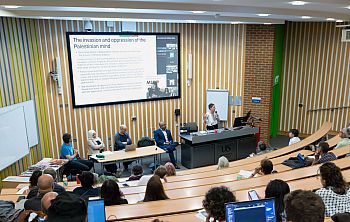
A central part of the event was the contribution of guest speakers from Gaza, who shared direct testimony of daily life under siege and occupation. Their names and images were not disclosed to protect their safety, but their presence was deeply felt. Attendees listened in silence as stories of loss, resilience and ongoing struggle unfolded.
The event closed with a moving call to action: to listen, to speak, and to resist the erasure of Palestinian voices—on campus, online and in public life.
The Palestinian Interdisciplinary Research Network at Sussex has been hosting events throughout the academic year. Staff and students interested in future sessions or in contributing to the network are invited to get in touch.
—
For more information about the Palestinian Interdisciplinary Research Network, contact:
James Andrews – ja424@sussex.ac.uk
To explore the BLDS Legacy Collection: https://bldslegacycollection.uk